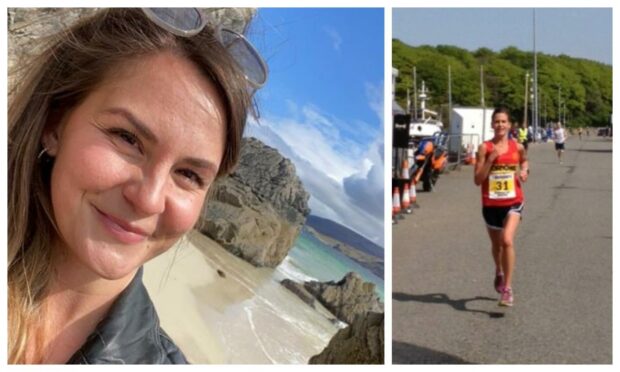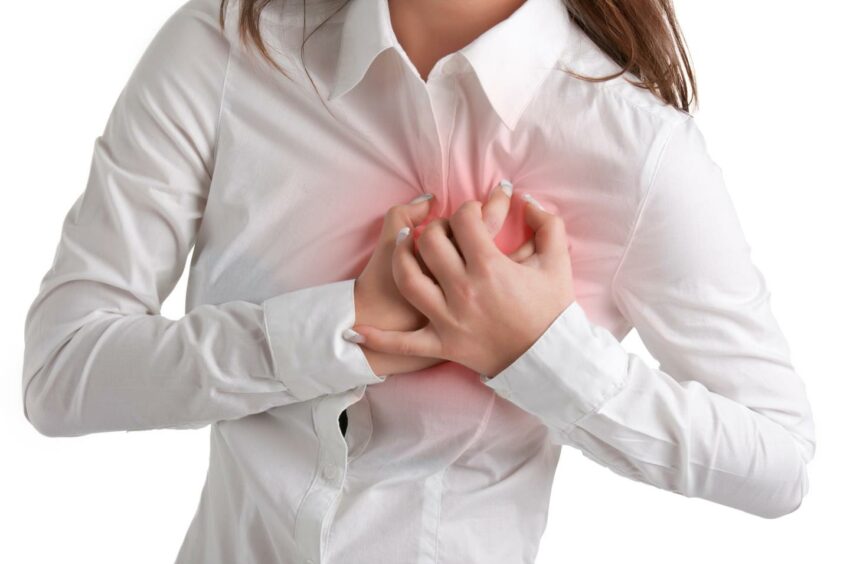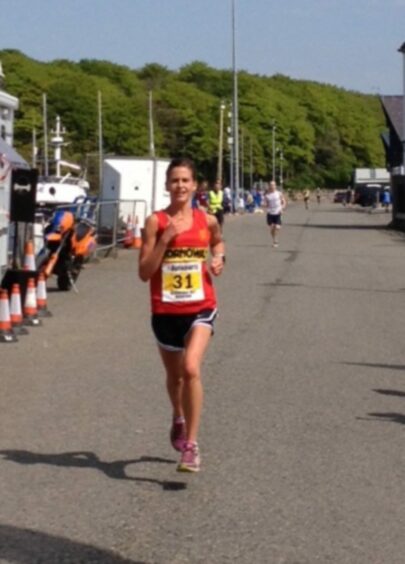Alanna Goddard can remember feeling “different” to her peers after a project in primary 5 where students were weighed in class.
“I was aware of my weight compared to everyone else,” she recalled.
“I recall it being different or heavier than most other pupils in my class.
“[It] made me feel and question why I was heavier than others.”
Now 28, Alanna has bravely spoken about her experiences with anorexia and orthorexia to help others during Eating Disorder Awareness Week.
Anorexia causes relentless motivation for thinness and a fear of gaining weight, while orthorexia is an obsession with healthy foods and avoidance of “fear foods”.
‘Fixated on my body shape’
Alanna moved to Stornoway in 2013 and took up long-distance running to make friends, going on to be a competitor in the 2015 Island Games held in Jersey.
However, the combination of her excessive exercise and disordered eating caused her to stop menstruating for five years.
“Back then I kind of thought: ‘Great I don’t have a period, it can’t interfere with my running’.
“With anorexia, you’re fixated on your body shape and keeping a low weight and because I was competing and running, it kind of coincided with each other.
“The smaller I was getting, the faster my time was getting.
“In my mind, when people were telling me ‘You’re getting too small,’ I was thinking ‘You’re just jealous [of my times].’
“My sister used to say to me: ‘You might not be able to have kids when you’re older, you don’t want that choice to be taken away from you.’
“I remember thinking I didn’t want kids then, so it didn’t matter.’
“I wasn’t thinking what future Alanna would be saying to me, I just didn’t care.”
Close to a heart attack
She was forced to take matters more seriously after being told she was on the brink of a heart attack.
“I got admitted to psychiatric services for eating disorders,” she said.
“When they assessed me, even the doctor was saying: ‘You were this close to either having a heart attack or collapsing.’
“Where I’d managed to get my body to, even he was amazed and that was scary to me, hearing the health implications that could happen to me.”
‘Telling you to eat a food you’re afraid of doesn’t help’
At 23, Alanna acknowledged her disorders and decided to get professional help.
She explained: “When I was diagnosed I was still living in the Outer Hebrides and the help was back over here on the mainland, so I moved home.
“Before that I’d had a GP interaction in the Outer Hebrides. That was the initial talk I had with the doctor and they were very understanding and compassionate.
“But the help I needed was over here and I was admitted to an eating disorder specialist for two years who was amazing, but I did have a couple of interactions with dieticians.
“I was writing down what I’d eaten in a food diary and I remember them looking at it and pointing out I wasn’t eating many carbohydrates, which was true.
“But that was a ‘fear food’ for me. When you have an eating disorder and someone tells you to eat something you’re afraid of, it doesn’t really help.”
Alanna feels there should be more support given in situations like this.
She added: “Looking back, maybe there needed to be more intervention around how to help somebody to eat these foods instead of just saying: ‘This is what the problem is’.”
‘Decision to stop running was really hard’
Eventually, Alanna’s period returned last year, but this meant giving up her beloved running, which she still hopes to return to one day in a safe manner.
She said: “To recover my period, I basically had to be in an energy surplus, my body had to feel like there’s energy coming in without a deficit.
“This meant I had to take in more than I was moving in order to have a constant supply of energy because for years I was depleted.
“I didn’t have to stop running, but they said it wouldn’t help me get my period back and that was a conscious decision I had to make and I found it really hard.
“I loved running, I was good at it and it’s something that I will take back up, maybe not to the standard I was at, but I’d do it for enjoyment now.”
‘Whole world needs to be educated’
Alanna is an ambassador for eating disorder charity Beat, which is using this week of awareness to call for greater medical training.
A survey from the organisation found almost 70% of people felt their GP was unable to help them.
Additionally, 92% felt their GP needed more training on eating disorders.
Alanna said: “I thinking knowing more about eating disorders would absolutely help them.
“That doesn’t just go for GPs, I think it’s the whole world.
“It is a bit of a taboo subject and I don’t think a lot of people are aware. Eating disorders are so complex and there’s so many different types.
“The earlier you manage to treat the disorder, a quicker recovery is more likely.”
Tips for friends and family
Alanna went on to give advice to the loved ones of someone with an eating disorder.
“Be there for them,” she said. “Having my dad there was massive, just having that person you could speak to about how you’re feeling, what you’re thinking.
“I knew my dad couldn’t fix me, it was never a case of getting him to give me the answers, it was just knowing he was there, not judging me.
“He was basically a soundboard at times and I would say to anyone who has a loved one [with an eating disorder] be there for them, notice the behaviours and maybe try and read up about it to get a better understanding of what it is they have.
“One of the main reasons I recovered was having my dad there.”
Read more:
Man who hit ‘rock bottom’ with body image issues turns his life around with boxing
Freddie Flintoff to confront his eating disorder in personal documentary



